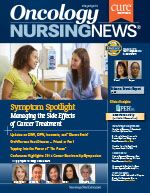Once Again, Laughter Is Still Good Medicine
As those of us immersed in our roles as oncology nurse navigators know only too well, each day holds the potential to be filled with unexpected
“Penny

Penny Daugherty, RN, MS, OCN
As those of us immersed in our roles as oncology nurse navigators know only too well, each day holds the potential to be filled with unexpected—and sometimes amazing—events. Last November, a nurse from our hospital’s Physician Referral line called me to say she had just spoken with an extremely emotional patient who wanted to see one of the gynecologic oncologists at University Gynecologic Oncology (UGO), a Northside Hospital Cancer Institute—affiliated practice. More precisely, she said that this patient was hysterically crying and insisting she be seen immediately.
I called this patient (who I will call Sally), and indeed, she was screaming and intermittently crying, as she implored me to get her the very first available appointment with one of the oncologists at UGO, “to get this cancer out of me right now!”
I immediately secured the first available appointment and then assiduously worked with the practice nurses and schedulers to have all diagnostic tests completed. Each time I spoke to Sally regarding her tests, I heard a consistently hysterical diatribe. She was filled with panic and massive anxiety at the probability of an ovarian cancer diagnosis.
As usual, I met Sally and her husband at that first appointment, and while in the waiting room, she went up to each patient and boldly solicited their experience with the practice and about their own ovarian cancer diagnosis.
One of the ladies who had been on and off treatment for 11 years offered comforting words to Sally and said that her ovarian cancer had simply become, for her, a “way of life.” Hearing that, Sally began to scream and sob, yelling. ”Oh my God, it comes back? It just stays in your body forever?” This went on for several minutes, and we brought her back to the little family room and encouraged her to have some calming herbal tea.
As Sally began her chemotherapy, she experienced the usual side effects of queasiness, constipation, and fatigue. She called me as well as the practice chemo coordinator numerous times each day—usually crying and filled with apprehension.
The wig she had obsessed about (in terms of “looking fake”) actually became a lovely enhancement to her appearance. The pre-chemo angst was blunted by Benadryl as well as my constant visits to her each cycle where I went over her side effects, reassuring her about the normalcy of the symptoms she was describing.
Her husband would immediately jump up when he saw me and vanish from the infusion suite, and Sally would implore me tearfully not to abandon her as the dreaded chemo infused.
Time passed, and Sally relaxed somewhat (possibly assisted by the chemo pre-meds) and on this day when I went to see her, and after we chatted for a while, she suddenly looked at me and laughed. She said she had decided she would love to have my job. She said, laughing delightedly, “You have the easiest job in this hospital. You just walk around like a social butterfly, making charming conversation with everyone. I’d like to be paid for what you do, and I’m sure you’re paid very well.”
I smiled, but I was also relatively peeved, and I wound my way back to my office experiencing more than a bit of self-righteous annoyance—reflecting on my work with our patients and their loved ones as they go through the generally dismal trajectory of ovarian cancer. I thought about watching friends made in the chemo suite relapse and die and of the hospices and funerals I’ve attended. I almost had to sit down on the staircase and cry for all those beautiful women I’ve had the humbling privilege to help navigate this surreal experience, only to die a very ugly death with their families as helpless attendants.
And then, at the end of the day, when I got into my car, I suddenly started to laugh, more at myself than anything else. Our Sally—she, who once couldn’t compose herself as a newly diagnosed ovarian cancer patient—had actually recalibrated to restore her sardonic sense of humor and observe my role through her perspective.
Sally was in the process of reclaiming her individuality. I had been successful in helping her to navigate her way back to her sense of self. Her impression of my work didn’t meet my lofty standards and admittedly, stung my pride, but judging from her gleeful and ever-so-charming southern belle smile, the exchange definitely proved a success for her, and for the very first time, her husband (who remained by her side this particular day) laughed out loud.
Thus we learn, each day in our role as nurse navigators, that we do not paint the portrait: we provide the supportive and accepting frame for our patients to fill in with their own colors. And for those of us who chose to do this work, we understand why a sense of humor is so crucial.
Penny Daugherty is an oncology nurse navigator specializing in gynecologic oncology and multiple myeloma at the Northside Hospital Cancer Institute in Atlanta.

Innovative Program Reduces Nurse Turnover and Fosters Development
Published: September 12th 2024 | Updated: September 12th 2024The US Oncology Network (The Network) has developed one of the most comprehensive programs in the nation to support the professional development and retention of new oncology nurses.


